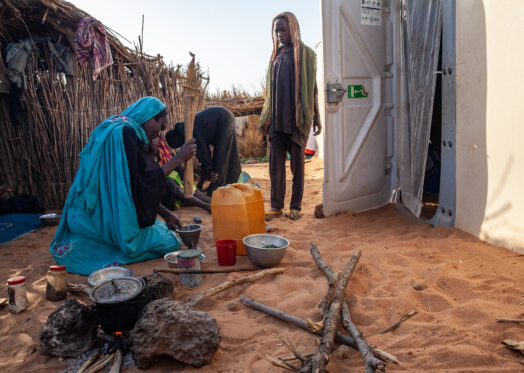Sudan forgotten war

Well before sunrise 11 years old Samira leaves her shack in the Aboutengue refugee camp where she lives with four little brothers and sisters. She walks barefoot for over three hours along a sandy path, winding past the thorny bushes and rugged rocks scattered across the savannah. To collect wood she must go farther from the camp each day. Those who have donkeys are luckier, they can grind more road and carry more wood. But Samira doesn’t even have shoes. When she has gathered all the dead branches she can carry on her head, she sets out again. Three more hours under the blazing sun. Exhausted, she reaches the hut in the camp and drinks some of the water her mother keeps in a yellow canister, filled after a long wait with hundreds of other women at the Hcr distribution point. Then she slumps to the ground and lies down to sleep in the shade of a plastic sheet. Some of the wood she collected will be used to cook the family’s only daily meal, a sticky soup of sorghum flour and green leaves. The rest is laid out on the pathway: neighbors will come and buy it for a few Sudanese pounds, enough for Samira’s mum to purchase some oil and salt at the market. It’s an ongoing survival fight for 38 years old Aziza, who is breastfeeding the last born: her husband disappeared five months ago and she must provide for Nadra, Samira, Attaib and Yasir.
Rations distributed once a month by the Wfp are not enough. Water is down to 8 liters per head and the hot season is approaching. The Msf hospital is on high alert for more cases of children severe malnutrition.
The Aboutengue camp houses roughly 50,000 refugees: a fraction of the 600,000 or more who crossed into Tchad since April 2023, when the war in Sudan flared up again with savage ferocity. Back in 2004 I was in Darfur and saw how the Janjaweed, the Arab militias, attacked and torched dozens of villages, killing thousands of unarmed civilians of the local Zaghawa and Massalit tribes. Now the Janjaweed have morphed into the Rapid Support Forces (RSF), led by general Mohamed Hamdan “Hemedti” Dagalo: his power struggle with general Abdel Fattah al-Burhan, head of the Sudanese Armed Forces (SAF), has plunged the country in a deadly civil war for the control of the state and its vast resources. In recent weeks the SAF have regained more positions in the ravaged capital Khartoum and in the Central and Southern provinces, but the RSF have consolidated their hold in the West, raising fear of a partition of the country. El-Fasher, North Darfur main city, is under siege: its fall would deliver the entire gold-rich region to the control of Arab militias, paving the way to further massacres and ethnic cleansing.
The world, focused on Ukraine and the Middle East, doesn’t give a shit. Yet the conflict has provoked one of the world’s biggest humanitarian catastrophes. Over 10 million Sudanese people are now internally displaced without any assistance and 2 million, mostly women and children, have fled to neighboring countries, while 19 million children are without education and at risk of abuse or exploitation.
And now Donald Trump has stepped in, announcing huge cuts to the United States Agency for International Development (USAID), which distributes tens of billions of dollars’ worth of overseas aid every year. A move that will have a devastating impact on all the programs reliant upon US funding worldwide. In South Africa, a large number of HIV services have already stopped. In Bangladesh, nearly 600,000 people, including Rohingya refugees, face losing access to critical maternal and reproductive health services. In Pakistan 60 clinics for Afghan refugees have shut down. The Roman Catholic Church’s charity Caritas has warned that Trump’s cuts would “kill millions of people and condemn hundreds of millions more to lives of dehumanizing poverty”.
Here in Aboutengue camp the Wfp is reassessing its food distribution plans and the secondary school has closed. Samira, who used to do one school day and one of wood gathering, will be forced to walk longer, push farther, and load a heavier weight on her skinny shoulders.
But does anybody care?





